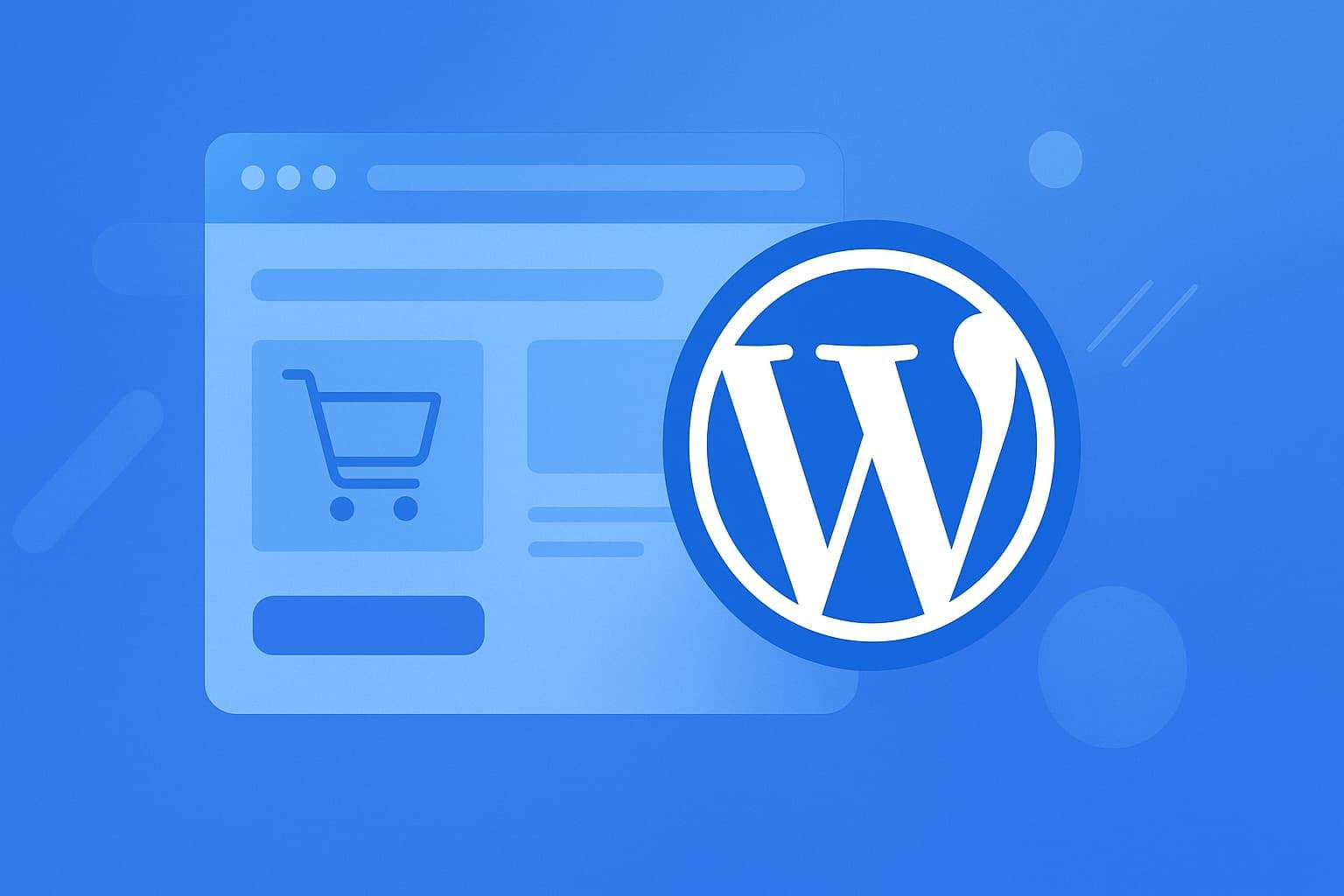Why Every E-commerce Website Needs WordPress Support

If you run an online store, WordPress support is not a luxury—it’s a necessity. With over 43% of all websites built on WordPress (Hostinger, 2025), businesses rely on it for flexibility, SEO strength, and scalability. WordPress combined with WooCommerce powers nearly 34% of all online stores globally. That means one in every three e-commerce sites already trusts WordPress.
In this guide, you’ll learn why every e-commerce website needs dedicated WordPress support, backed by real-world data, expert quotes, and practical advice to help your business thrive online.
Table of Contents
What Makes WordPress Essential for E-commerce
1. It’s the Most Popular CMS in the World
WordPress dominates the CMS market, holding over 62% market share (WPWorth, 2025). This dominance guarantees ongoing updates, a massive support community, and a plugin ecosystem that keeps growing.
“WordPress can flex to fit almost any kind of business.”
— NexaLab Insights (2025)
That flexibility allows e-commerce owners to design unique shopping experiences that align perfectly with their brand and customers.
2. Full Ownership and Control
When you host your store on WordPress, you own your data, content, and code. Unlike closed platforms such as Shopify or Wix, WordPress gives you complete control over customizations, integrations, and even hosting.
Having ownership means:
- You’re not tied to vendor limitations.
- You can move your store anytime.
- You control your customer data.
For long-term stability and compliance (like GDPR or local privacy laws), this ownership is crucial.
3. Cost-Effective Growth
WordPress is open-source and free. You only pay for hosting, themes, and essential plugins. As your business grows, you can scale costs gradually.
“Stores with thousands of products and heavy traffic run on WooCommerce every day.”
— NexaLab.io
Unlike platforms that charge monthly fees or transaction percentages, WordPress lets you allocate funds toward marketing or support instead of platform costs.
4. SEO Advantage Built Right In
WordPress is SEO-friendly by design. With plugins like Rank Math and Yoast SEO, you can easily optimize:
- Product titles and meta descriptions
- Image alt texts
- URL structure
- Schema markup
“Search is still one of the biggest ways customers find products—and WordPress has always been strong on SEO.”
— WPMayor.com
For e-commerce, where visibility equals sales, having native SEO advantages gives WordPress an edge over closed platforms.
5. Plugin Power and Integration Options
The WordPress Plugin Directory offers 59,000+ plugins (WordPress.com, 2025). You can add features for payment, shipping, CRM, marketing automation, or analytics—without writing code.
Top plugins for e-commerce include:
- WooCommerce (store management)
- WP Rocket (speed optimization)
- UpdraftPlus (backups)
- Wordfence (security)
- Rank Math SEO (search optimization)
With proper WordPress support, your tech stack stays optimized, secure, and conflict-free.
Why Ongoing WordPress Support is Non-Negotiable
1. Performance Optimization
E-commerce shoppers expect fast page loads. Even a 1-second delay can reduce conversions by 7% (Portent, 2024). WordPress support includes caching, CDN setup, and database optimization—critical for high-traffic stores.
2. Security Monitoring
Because WordPress is so popular, it’s a target for hackers. According to AAMAX (2025):
“WordPress sites are frequent targets for hackers… using too many third-party plugins or skipping updates increases security risks.”
Support services ensure your store remains secure with regular updates, malware scans, firewalls, and offsite backups.
3. Regular Maintenance and Updates
Plugins, themes, and the WordPress core receive frequent updates. Without consistent maintenance, outdated components can cause crashes or vulnerabilities. Support teams handle updates safely and test compatibility before deployment.
4. Technical Troubleshooting
From payment gateway issues to theme conflicts, technical problems can kill sales. Dedicated WordPress support ensures you get fast fixes—reducing downtime and protecting revenue.
Real-World Data: Why WordPress Works for Online Stores
| Metric | Statistic | Source |
|---|---|---|
| Websites powered by WordPress | 43.5% of all sites | Hostinger, 2025 |
| Market share among CMS platforms | 62% | WPWorth, 2025 |
| E-commerce stores powered by WooCommerce | 33.8% | SpreadThoughts, 2025 |
| Projected global retail e-commerce sales (2025) | $7.53 trillion | Statista, 2025 |
These numbers highlight that WordPress isn’t just popular—it’s proven, trusted, and built to scale with e-commerce demand.
Expert Insights on WordPress Support
“WordPress gives merchants complete freedom to grow on their own terms.”
— Mark Forrester, Co-founder, WooCommerce
“Open-source means your store’s future isn’t tied to one company’s decisions.”
— Matt Mullenweg, Creator of WordPress
“With proper optimization, WordPress can outperform many closed platforms in flexibility and performance.”
— Chris Lema, WordPress Business Strategist
These experts agree: WordPress’s success relies on proper support, maintenance, and optimization.
How to Build a WordPress Support Framework
Step 1: Choose Optimized Hosting
Use WordPress-specific hosting providers (like SiteGround, WP Engine, or Hostinger). Look for SSD storage, caching, and automated backups.
Step 2: Schedule Regular Maintenance
Create a maintenance calendar that includes plugin updates, theme checks, database cleanup, and speed testing.
Step 3: Set Up Monitoring Tools
Use tools like UptimeRobot or Pingdom to monitor performance and downtime.
Step 4: Backup and Security
Implement UpdraftPlus for backups and Wordfence or Sucuri for firewalls and malware scans.
Step 5: SEO and Analytics Integration
Install Rank Math and Google Analytics 4 (GA4) for traffic insights and search performance tracking.
Step 6: Partner with Experts
Consider managed WordPress support services or agencies for peace of mind. They handle everything—so you focus on sales, not site errors.
Common Mistakes E-commerce Sites Make (and How to Fix Them)
| Mistake | Impact | Fix |
|---|---|---|
| Using too many plugins | Slows site, causes conflicts | Keep only essential plugins |
| Ignoring updates | Security risks | Automate or schedule updates |
| No backups | Data loss after crash | Use UpdraftPlus or Jetpack |
| Poor hosting | Downtime, slow checkout | Choose managed WordPress hosting |
| Weak SEO | Low organic traffic | Use Rank Math and blog consistently |
Conclusion: Build a Future-Proof E-commerce Store with WordPress
Your e-commerce website is your business engine—and WordPress gives you the power, control, and scalability to drive it forward. But like any high-performance vehicle, it needs regular tuning and expert care.
By investing in WordPress support, you protect your store from downtime, improve site speed, strengthen security, and unlock long-term SEO growth.
👉 Action Step:
Audit your current website today. Check for speed, updates, and security. Then, invest in a WordPress support plan that keeps your store healthy, fast, and profitable.
FAQs about WordPress Support for E-commerce
Is WordPress good for large e-commerce stores?
Yes. With optimized hosting and caching, WordPress easily supports thousands of products and high traffic volumes.
Can WordPress handle international stores?
Absolutely. You can enable multi-currency, language translation (WPML), and regional tax options using plugins.


